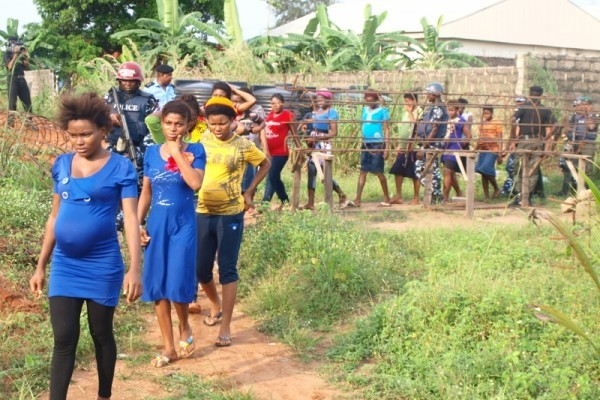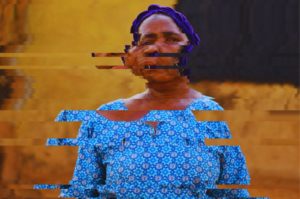When I received Omojola’s story and read it, I sent him an email telling him how sad and troubled the story left me. I couldn’t wrap my heard around such misfortune.
Then I found this news report and this one about this really weird phenomenon called baby farming. And I realized that Amara’s story is beautiful and titillating as far as fiction goes, but that it is also urgent in the sense that Amara could very well be one of these girls in the image below. See why in the final part of Omojola’s three-part story that you’ve all loved and enjoyed in the past two weeks.
If you haven’t been following, read Part One and Part Two.
Seven months had passed since the day she learned she was pregnant.
Amara briefly caught her reflection in front of the mirror. She could barely recognize the wizened looking creature that stared back at her. The description that fit her best was ‘gaunt’. Her hair was what women called ‘due’ and unkempt. It stood erect, on end, forming what looked like two bushy, black horns on either side of her head. She hadn’t touched it with a comb or cream in the seven months Julius had dumped her in the lodge. Her complexion had gone from fair, to ashy and now to black, and when she opened her mouth, her cheeks collapsed into two bottomless chasms on either side of her face. Her shoulders were bony, the ball and socket joints of them sticking out of the blue off-shoulder gown that she wore. Her breasts were fuller, and somewhat flabbier. She was not wearing a brassiere, so they laid like two timid lambs on the mountain that was her stomach. A sickening smell always oozed from a part of her body that she was yet to identify.
She had entered the ninth month, was always in a permanent state of discomfort. The baby was always twisting and turning. It seemed that it held a cord in her chest that it yanked at will. And when it did that, a bell rang in her head. She would have to sit up, and gasp for breath.
“It is boys that disturb like that,” one of the girls had told her. “You are lucky. They will pay you more, maybe twenty thousand naira.”
That was another thing she had come to learn in this house of horror.
When she had told Julius that she was pregnant, he had surprised her with his reaction. She had expected him to rave and rant and push her out of his apartment. But no, he had just smiled and made her sit on his knees.
“Obi’m, how did you let that happen?” he asked gently as she sobbed. “I expected you to know better than that, to protect yourself.”
“I’m sorry Jay,” she had pleaded through sobs, her face in her palms. She had heard the rustle of paper as Julius flicked the test report in his hand. “It says eight weeks, here. And you say you do not want an abortion, eh?”
She had shaken her head.
“What do you want us to do about it then, Obi’m?” he asked, wiping her tears with a perfumed, polka dotted handkerchief.
Since they loved each other, she was willing to put her academic ambitions on hold for a year or two, get married to Julius and have their baby.
Julius had burst into a wild sounding kind of laughter when she had voiced those plans. He laughed so hard that he unconsciously pushed her away from him, fell from the chair and sat heavily onto the rug. He pointed at her, spittle drooling from one side of his mouth. She had never seen him look or act that way before, and she had been a little shocked. What was he laughing at? Her? Or had she said something out of turn?
She stood there for minutes looking at him, her arms folded across her breasts as the sun outside faded from a dull yellow tone to a blurry red.
“Okay, okay dear. No problem, no problem at all. Marriage it is then. This is how shit’ll work. Tomorrow, I will take you to see my parents. Since your father will most likely not want anything to do with you anymore, I bet you can stay with my parents until all the arrangements have been concluded for igbankwu. You can probably tell only Ada about it all, since she seems like a sport. Everything will be fine,” Julius had assured her, pulled her down onto the rug beside him, and before she could voice her concerns, filled her with his throbbing member. His emphatic love making had answered all her questions convincingly – all would be well.
It was that evening that she had told Ada she was pregnant, and Ada had walked out on her. Even as she dressed up to go to school the next day, Ada had refused to listen to her, turning her face rigidly to the wall and yelling at her to ‘Si ebea puo – get lost.” And she did.
Julius had driven her to the maternity lodge the next day.
They made the three hour journey to the interior parts of Enugu in utter silence. She was not in a chatty mood anyway, and it seemed Julius too had a lot on his mind, probably in preparation for his new roles, as a father and a husband. The road was very bad, and they passed only a handful of people on their way- children in bright uniforms, carrying chairs and desks on their heads, farmers on bicycles, and a few lorries and other vehicles going to and from the villages.
They finally arrived at about 11.30 am to the walled compound. Amara wondered why the walls were so high but she did not say anything. It was the only modern building in the community, and Amara put it down to Julius’ considerable wealth. A good son had to make his parents comfortable.
An old man opened the gates for their car, and Amara felt her spirit sink for no clear reason when the gates swung close behind their car. The compound was big and wide, with gravel on the grounds. The building was big too, a pink colored one storey affair with black iron burglar proofs and verandas.
“Get down,” Julius ordered her as the car came to a halt. She complied. She looked behind her and saw the old gateman still standing at the gate, a look Amara could not quite place plastered on his ancient face. He just stood there and stared at her, and then he made a sign with his hands, mouthed something and ambled into the gate-house as Julius climbed out of the car.
Amara did not need a soothsayer at this point to tell her that something was amiss, a feeling that was confirmed when they entered the building.
Pregnant young girls milled around the large empty space downstairs. The place smelled like a hospital, and Amara had panicked, thinking at first that Julius had brought her here for an abortion. He held her by the hand as they walked past the first room, a gesture that reassured her for only a second. She could feel the eyes of the other girls following them as they walked. There was no nurse in sight.
“Where is this place, Julius?” she asked, quietly as they climbed the stairs.
“Shh, quiet, you will see,” he had responded as he stopped by a door and knocked. Her heart was beating uncontrollably by the time handle dipped, and the door opened inwards. They stepped into what looked faintly like a doctor’s office. The furnishing was sparse – with two seats to the side and against the wall. There was a patient’s bed with dark red stains on the brown leather mattress. In front of a window with a dark green blind sat a brown desk. On its body was pasted several stickers advertising an assortment of drugs: Octivin, PregnaCare, Chloramphenicol.
In font of the desk perched the smallish man who had opened the door for them, his hands on the table behind him. She later grew to know him simply as Okpeten. He had grey hair and wore a pair of steel rimmed glasses. He had a bitter smile on his wrinkled face as he embraced Julius.
“That’s her?” she heard him ask, as she settled on a chair by the wall that Julius showed to her.
“Let’s talk outside,” Julius invited the old man, whistling a tune under his breath. And turning to her, he had bent his head, a crooked smile playing on his lips, he used the tips of the fingers of his right hand to rub the middle of his chest in an up and down motion that meant for her to ‘relax’.
That was the last time she had seen Julius till now although Ajuo, Okpeten’s mammoth of a wife always told her when he sent money for her upkeep, and that he would be here to see her soon.
Amara snatched her gaze off the mirror and ambled out of the toilet.
Her water had broken in the late afternoon. The pain was totally unbearable now. She could barely keep her thighs together. She stopped at the door, placed an arm on her waist and screamed.
The door jerked open and Okpeten and Ajuo rushed towards her. Gently, they steered her into the delivery room and urged her to take it easy.
Amara wailed as they laid her on the blood stained bed.
“Just take it easy, easy, easy…” Okpeten cooed, his head buried between her thighs.
The room spun round and round in Amara’s eyes, and Ajuo’s watery face swam in her vision. She felt as if her waist was being severed from the rest of her body. Her vagina was on fire and she felt as if someone had taken a shovel to her innards and was digging out the contents with cruel, crunching blows.
“I’ve seen the head, I’ve seen the head,” she heard Okpeten say again and again. Suddenly, she felt something heavy clog the space between her legs before the room dissolved into a sea of darkness.
***
She stood at the edge of the big metal can and took a deep breath before peering into it. Now that he was asleep and quiet, she had to be cautious not to make any noise, not to awaken him.
She had searched for him all the way here, his faltering cries ringing in her ears and guiding her feet. It had been a long arduous journey and her feet ached, and bled where she had stepped on a rusty nail. The short, sturdy piece had buried itself deep into the sole of her right foot. She had screamed as she ambled to the side of the road and sat heavily on the grass. It had taken considerable energy to pull it out. Soon, the entire sole had been covered in blood. She had felt a bit dizzy and had to lean on a dying tree stump for support. The sun had lost its radiance, but its rays still scorched her. She had to shut her eyes for a moment, her head pounding as she lost blood. The blood continued to flow, despite her pleas and entreaties. When she felt a bit calmer, she had plucked green leaves and rubbed them between her palms until her palms had turned green. She then squeezed its water onto the wound. When the bleeding did not stop, she had rubbed the leaves themselves on the face of the wound. But the bleeding had only intensified. Using her teeth, she had torn off a long piece of her gown where there had been a hole, and tied the wound with it. That left her a bit naked in front. The bushy triangle between her thighs was in full glare and so was the whole of her left leg, from the thigh downwards. But, that could be taken care of later. She had to find her child. That was her first assignment. She had cut another branch off the medicinal plant and stuck it in her bushy hair, for future use. She hissed continuously as she continued her journey, stamping the aching foot on the ground as she walked. When the pain had become unbearable, she began to limp, unable to touch the affected foot to the ground.
Everyone she met on the lonely road made way for her. Not that she approached them or talked to them or anything. No. they just made faces at each other and packed themselves to one side when they saw her, giving her all the room on the road as if she were an approaching lorry. She had been particularly annoyed by the little boy who had burst into tears when he came upon her. He could not be more than four years old and he clutched a black nylon bag in his scrawny fingers. His knickers were torn and his ribs stuck out in his chest, creating a hollow stomach that gasped as he sniveled.
“Emeka! What are you doing here?” She had screamed, pleasantly surprised when she recognized him. But the poor fool kept on crying, stamping one foot after another in the reddish earth, a wet map suddenly appearing and changing dimensions in front of his knickers.
“Bia, nwanne’m! Ebezina, biko, Emeka’m,” she had pleaded, saddened at his discomfort. She had approached him with her arms wide open but the boy had backed away from her, screamed, dropped the nylon bag he was holding on the ground and fled back in the direction from which he came.
She just stood there, her arms stretched out in front of her, dazed. Then her eyes had fallen on the white granules that spilled from the bag the boy had dropped.
“Garri,” she whispered to herself. Suddenly, her stomach rumbled. She hadn’t eaten a thing in the past three days since she escaped – or since Okpeten and Ajuo had laughed in her face and pushed her out of the lodge, because she kept tearing her hair apart and asking for her baby. They had offered her money, but all she wanted was her baby. So they had cursed her and pushed her out of the lodge.
She had forgotten how to be hungry, but she remembered now. She bent down, picked up the nylon, settled down by the bushes on the road side and chewed.
She wondered where Julius was now that she needed him most, to help her fight Okpeten and Ajuo. He had left her alone for too long, for far too long.
His cries became louder as she ate, so she had rounded off quickly and proceeded on her journey. His cry emanated from every single plant on the roadside, from every tree in the distance, from the grass and the sand and the stones on the road. It had been a tough job examining each and every one of these crying things. People stared at her as she did it, but she had, like Okute the rock, long learned to be unmoved, come rain or shine.
She had jumped for joy when she finally came upon the garbage dump. Why hadn’t she thought of it before? What better place could Okpeten and Ajuo had chosen to hide him away from her, if not in the midst of all this waste?
She was shocked then when she peered into the huge garbage container and her baby was not there.
With little difficulty, she climbed into the can and rummaged. Nothing. She started to throw the garbage out of the can, at first painstakingly, one after the other. Then she started to heave them out in heaps. She worked for two hours before she got to the gritty bottom of the container. Still, nothing. Then she got frantic. She climbed out of the can and went to work on her knees, using her hands first like a hoe, then like a shovel. She wailed and retched as she sought her child. He was a cruel baby, keeping quiet on her, now that she was so close to finding him. She worked like a mad woman for another two hours, howling at the top of her voice. Then, disillusioned, she sat in the waste, pieces of garbage hanging in her hair and strewn all over her gaunt frame. She stretched her arms out to the crowd that had gathered and asked if any of them had seen her baby.
No one answered her directly. They just murmured among themselves and shook their big heads. One of the children pointed at her and spoke rapidly to his mother who slapped his outstretched hand, and said nothing. It was Emeka.
The skies began to weep and she jerked her head upwards, a stream of relief coursing through her system. A radiant smile spread across her face and her eyes shone with joy as she looked into the skies. Again, she should have known. Silly her, silly child. He should have let her know where he was earlier. She wrapped her arms around herself, getting as much of him as she could through his tears falling through the skies. The skies grumbled, a deep guttural sound and she buried her terror in its rasping breath. She was getting wet quickly and cold too, but it did not matter; she had found her child. The little crowd shook their large heads again and began to disperse – one after the other. She thanked each and everyone of them as they left.
She sat in the downpour until she could not tell her tears from the rain. When it abated, she laid in the soggy garbage and drifted off into a troubled slumber.
She dreamt of Julius, and Ada.
Ada was holding a baby on her shoulders, rapidly touching her fingers to her tongue and counting from a bundle of naira notes. She and Julius were happy, laughing merrily and pointing in her direction.
***
 Oluwafunminiyi Omojola is a Nigerian writer who is also a banker. Being a Yoruba man who is married to a Hausa lady and resident in Iboland, Funminiyi considers himself an epitome of the detribalised Nigerian.
Oluwafunminiyi Omojola is a Nigerian writer who is also a banker. Being a Yoruba man who is married to a Hausa lady and resident in Iboland, Funminiyi considers himself an epitome of the detribalised Nigerian.
His poems and short stories have appeared in many news dailies and magazines around Africa including The Sunday Sun, This Day, and The Kalahari Review.










mariam sule February 05, 2015 11:19
This is so nice. I loved this.